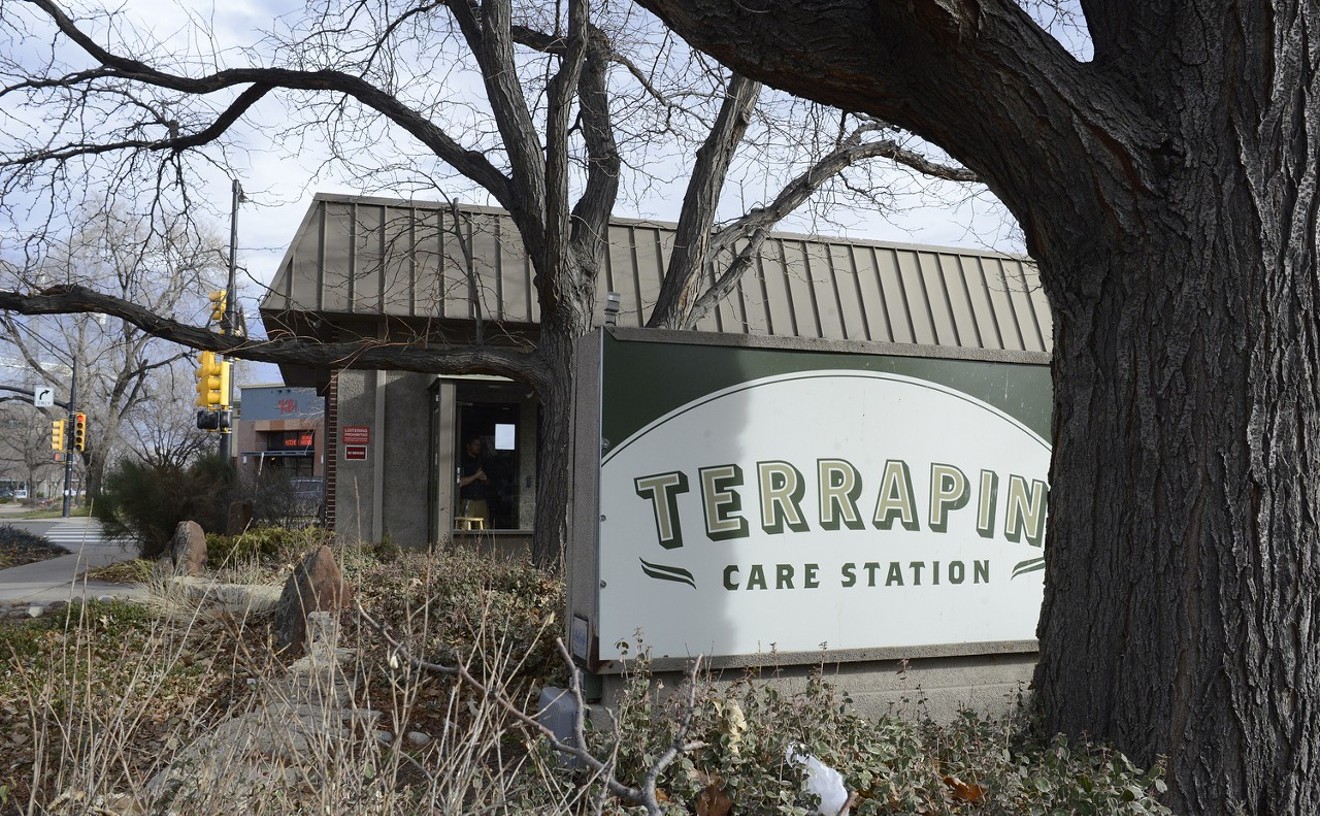While bills to provide medical marijuana patients with firearms rights and altered-state DUI laws regarding marijuana use are as good as dead, measures that allow pot delivery and set up social consumption licenses are still alive and kicking.
And with a vocal supporter of legal marijuana in Governor Jared Polis, pot advocates and business owners expect to see many of these bills signed into law.
Here's a breakdown of the fifteen marijuana and hemp proposals introduced so far (the summaries come from the text of the bills themselves), as well as their status:
HB 1028: Medical Marijuana Condition Autism
Prime sponsors: Representative Edie Hooton (D-District 10), Representative Kim Ransom (R-District 44), Senator Don Coram (R-District 6), Senator Stephen Fenberg (D-District 18)
Summary: The bill adds autism spectrum disorders to the list of disabling medical conditions that authorize a person to use medical marijuana for his or her condition. Under current law, a child under 18 years of age who wants to be added to the medical marijuana registry for a disabling medical condition must be diagnosed as having a disabling medical condition by 2 physicians, one of whom must be a board-certified pediatrician, a board-certified family physician, or a board-certified child and adolescent psychiatrist who attests that he or she is part of the patient's primary care provider team. The bill removes the additional requirements on specific physicians to align with the constitutional provisions for a debilitating medical condition. The bill states if the recommending physician is not the patient's primary care physician, the recommending physician shall review the records of a diagnosing physician or a licensed mental health provider acting within its scope of practice.
The bill encourages the state board of health, when awarding marijuana study grants, to prioritize grants to gather objective scientific research regarding the efficacy and the safety of administering medical marijuana for pediatric conditions, including but not limited to autism spectrum disorder.
Status: Amended version passed General Assembly; signed into law April 2.
HB 1031: Child Patient More Than One Primary Caregiver
Prime sponsors: Representative Matt Gray (D-District 33)
Summary: Under current law, a medical marijuana patient is limited to having one primary caregiver at a time. The bill makes an exception for a patient who is under 18 years of age and allows each parent or guardian to serve as a primary caregiver.
Status: Amended version passed General Assembly April 22; awaiting governor's signature.
HB 1055: Public School Cap Construction Financial Assistance
Prime Sponsors: Representative Shannon Bird (D-District 35), Senator Rachel Zenzinger (D-District 19)
Summary: Current law requires the greater of the first $40 million of state retail marijuana excise tax revenue or 90% of the revenue to be credited to the public school capital construction assistance fund (assistance fund) and limits the maximum total amount of annual lease payments payable by the state under the terms of all outstanding lease-purchase agreements entered into as authorized by the "Building Excellent Schools Today Act" (BEST) to $100 million. Beginning July 1, 2019, the bill:
- Requires all state retail marijuana excise tax revenue to be credited to the assistance fund;
- Increases the maximum total amount of BEST annual lease payments to $105 million for state fiscal year 2019-20 and to $110 million for state fiscal year 2020-21 and each state fiscal year thereafter;
- Changes the percentage of the state retail marijuana excise tax revenue credited to the assistance fund that is further credited to the charter school facilities assistance account of the assistance fund for distribution to charter schools from 12.5% to a percentage equal to the percentage of students included in the statewide funded pupil count who were enrolled in charter schools for the prior school year; and
- Changes the total amount of money annually appropriated from the state education fund for charter school capital construction from a flat amount of $20 million per year to $20 million per year annually adjusted for changes in the percentage of students included in the statewide funded pupil count who are enrolled in charter schools.

Governor Jared Polis, seen here touring a Northglenn marijuana facility in 2018, has been a vocal supporter of pot legalization.
Kenzie Bruce
Prime Sponsors: Representative Matt Gray (D-District 33), Representative Kevin Van Winkle (R-District 43), Senator Julie Gonzalez (D-District 34), Senator Owen Hill (R-District 10)
Summary: The bill repeals the provisions that require limited passive investors to go through an initial background check. The bill repeals the provisions that limit the number of out-of-state direct beneficial owners to 15 persons. The bill repeals the provision that prohibits publicly traded corporations from holding a marijuana license.
The bill creates 2 new ownership licenses, controlling beneficial owners and passive beneficial owners. The bill gives the state licensing authority rule-making authority related to the parameters of, qualifications of, disclosure of, requirements for, and suitability for the new license types. A controlling beneficial owner is a person that is the beneficial owner of 10% or more of the securities of a marijuana business, is an affiliate, or is otherwise in a position to exercise control of the marijuana business. A passive beneficial owner is a person that is not an affiliate of a marijuana business, has no control over the marijuana business, and owns less than 10% of the securities of a marijuana business.
The bill requires a person intending to apply to become a controlling beneficial owner or passive beneficial owner to receive a finding of suitability or an exemption from the state licensing authority prior to submitting a marijuana business application. When applying for suitability, a person must disclose all of its officers, directors, and affiliates; all controlling beneficial owners; if a publicly traded corporation, all of its controlling beneficial owners of 10% or more; and, if not a publicly traded corporation, all of its officers, directors, beneficial owners, affiliates, and passive beneficial owners. The bill also requires a marijuana business or controlling beneficial owner that is a publicly traded corporation to comply with various notification, disclosure, notice, and suitability requirements. The bill limits the types of publicly traded corporations that can be marijuana businesses or controlling beneficial owners.
Current statutes list areas in which the state licensing authority may adopt rules but does not limit the rules to those areas. The bill limits the state licensing authority's power to adopt rules to those areas listed in statutes.
Status: Amended version passed General Assembly April 27; awaiting governor's signature.
HB 1146: Tandem DUI Per Se
Prime Sponsors: Representative Dylan Roberts (D-District 26), Representative Hugh McKean (R-District 51)
Summary: The bill adds a new traffic offense of tandem DUI per se if a peace officer has evidence to believe that a driver had consumed alcohol or drugs, that the driver was substantially incapable of safely operating a vehicle, and that the driver had any measurable amount of a drug in his or her blood or oral fluid. The penalties for tandem DUI per se are the same as for DUI. The bill repeals the 5 nanogram THC threshold for the presumption that a driver is under the influence of marijuana.
Status: Postponed indefinitely by House Judiciary Committee February 12.
Prime Sponsors: Representative Jonathan Singer (D-District 11), Representative Jovan Melton (D-District 41), Senator Vicki Marble (R-District 23), Senator Julie Gonzalez (D-District 34)
HB 1230: Marijuana Hospitality Establishments
Summary: If approval is received by both the state and local licensing authorities, the bill authorizes legal cannabis hospitality spaces in which legal cannabis may be consumed on site and retail cannabis hospitality and sales establishments in which retail marijuana, retail marijuana concentrate, and retail marijuana products may be sold and consumed on site in the establishment's hospitality space.
The bill establishes requirements and prohibitions for the new hospitality spaces and requires the state licensing authority to promulgate rules governing the new hospitality licenses and spaces.
The bill makes the hospitality spaces an exception to the "Colorado Clean Air Act" and makes conforming amendments.
Status: Amended version passed House April 18; up for Senate floor work April 29.
HB 1234: Regulated Marijuana Delivery
Prime Sponsors: Representative Alex Valdez, (D-District 5), Representative Jonathan Singer (D-District 11), Senator Vicki Marble (R-District 23), Senator Julie Gonzalez (D-District 34)
Summary: The bill creates marijuana delivery permits for licensed medical marijuana centers and transporters and licensed retail marijuana stores and transporters that allow the centers, stores, and transporters to deliver medical marijuana, medical marijuana-infused products, retail marijuana, and retail marijuana products to customers. The bill gives the state licensing authority rule-making authority over the permit and delivery system. Medical marijuana delivery permitting begins January 2, 2020, and retail marijuana delivery permitting begins January 2, 2021.
The bill requires responsible vendor training programs to include marijuana delivery training.
Status: Amended version passed House April 18; up for Senate floor work April 29.
HB 1311: Institute Of Cannabis Research Role And Mission
Prime Sponsors: Representative Jonathan Singer (D-District 11), Senator Jeff Bridges (D-District 26)
Summary: The bill creates the institute of cannabis research (institute) at Colorado state university - Pueblo. The role and mission of the institute is to conduct research related to cannabis and publicly disseminate the results of the research. The bill creates the institute of cannabis research governing board (governing board), which will oversee the institute. The bill creates a process to relocate the institute if Colorado state university - Pueblo wants to stop hosting the institute or if the governing board believes that the institute should be relocated.
Status: Amended version passed General Assembly April 27; awaiting governor's signature.
SB 13: Medical Marijuana Condition Opiates Prescribed For
Prime Sponsors: Senator Vicki Marble (R-District 23), Senator Joann Ginal (D-District 14), Representative Edie Hooton (D-District 10), Representative Kim Ransom (R-District 44)
Summary: The bill adds a condition for which a physician could prescribe an opiate to the list of disabling medical conditions that authorize a person to use medical marijuana for his or her condition. Under current law, a child under 18 years of age who wants to be added to the medical marijuana registry for a disabling medical condition must be diagnosed as having a disabling medical condition by 2 physicians, one of whom must be a board-certified pediatrician, a board-certified family physician, or a board-certified child and adolescent psychiatrist who attests that he or she is part of the patient's primary care provider team. The bill removes the additional requirements on specific physicians to align with the constitutional provisions for a debilitating medical condition. The bill states if the recommending physician is not the patient's primary care physician, the recommending physician shall review the records of a diagnosing physician or a licensed mental health provider acting within its scope of practice. The bill limits a patient with a disabling medical condition who is under eighteen years of age to using medical marijuana only in a non-smokeable form when using medical marijuana upon the grounds of the preschool or primary or secondary school in which the student is enrolled, or upon a school bus or at a school-sponsored event.
Status: Amended version passed Senate February 14; up for House floor work April 29.
SB 93: Firearms Rights of Medical Marijuana Users
Prime Sponsors: Senator Vicki Marble (R-District 23), Representative Bri Buentello (D-District 47)
Summary: Current law prohibits a person from carrying a firearm if the person has a prior conviction for a felony or conspiracy to commit a felony pursuant to Colorado law, the law of any other state, or federal law. The bill clarifies that a person is not prohibited from carrying a firearm if the prior conviction was for the possession or use of marijuana that was lawfully possessed or used pursuant to the Colorado constitution.
Under current law, a sheriff may deny an application for a permit to carry a concealed handgun when the applicant is ineligible to possess a firearm pursuant to Colorado or federal law or the applicant is an unlawful user of, or addicted to, a controlled substance, as defined by federal law or regulation. The bill clarifies that a person is not considered to be ineligible to possess a firearm pursuant to federal law nor considered to be an unlawful user of, or addicted to, a controlled substance because of the possession or use of medical marijuana pursuant to the Colorado constitution.
The bill clarifies that the department of public safety is prohibited from sharing confidential information relating to the medical marijuana registry with law enforcement for the purpose of conducting a background check related to the transfer of firearms.
Status: Postponed indefinitely by Senate State, Veterans, and Military Affairs Committee on February 6.
SB 213: Marijuana Cash Fund Transfer
Prime Sponsors: Senator Bob Rankin (R-District 8), Representative Kim Ransom (R-District 44)
Summary: The bill requires the state treasurer to make 2 transfers from the marijuana cash fund to the marijuana tax cash fund. On July 1, 2019, the state treasurer will transfer $914,416, and on July 1, 2020, the state treasurer will transfer $890,901.
Status: Amended version passed General Assemble April 9; awaiting governor's signature.
SB 218: Sunset Medical Marijuana Program
Prime Sponsors: Senator Julie Gonzalez (D-District 34), Representative Sonya Jaquez Lewis (D-District 12)
Summary: In a bona fide physician-patient relationship for purposes of a medical marijuana recommendation, the bill clarifies that if the patient is a child, as part of the relationship the physician must consult with the patient's parents. The bill clarifies that only a physician can make a medical marijuana recommendation. The bill clarifies that a parent can be a primary caregiver for a child with a disabling medical condition. The bill clarifies that a primary caregiver for a person with a debilitating or disabling medical condition receives the same confidentiality protections as other primary caregivers. The bill clarifies that if a person with a medical marijuana card is convicted of a drug crime, the card is subject to revocation.
The bill allows a medical professional with prescriptive authority acting within the scope of his or her practice to make medical marijuana recommendations for a disabling medical condition. The bill gives the state health agency the authority to promulgate rules regarding the length of time that a medical marijuana card for a disabling medical condition is valid.
Under current law there is a health care panel that monitors the health effects of marijuana and provides a report every two years. The bill requires the panel to include individuals with expertise in neuroscience, epidemiology, toxicology, cannabis physiology, and cannabis quality control. The bill requires the panelists to disclose all financial interests related to the health care industry and the regulated marijuana industry and report those disclosures in the panel's report. The bill gives the department of public health and environment the authority to collect Colorado-specific data that involves adverse health outcomes associated with cannabis from all-payer claims data, hospital discharge data, and available peer-reviewed research studies.
The bill extends the medical marijuana program until September 1, 2028, and requires a sunset review prior to the repeal. The bill makes other technical changes and repeals obsolete provisions.
The bill appropriates $114,007 to the department of public health and environment from the medical marijuana program cash fund, of which $100,000 is for operating expenses for the registry and $14,007 is for personal services. The bill appropriates $560,143 to the department of regulatory agencies from the division of professions and occupations cash fund of which $535,456 is for legal services and $24,687 is for personal services.
Status: Amended version passed Senate 23; up for House floor work April 29.
SB 220: Hemp Regulation Alignment With 2018 Federal Farm Bill
Prime Sponsors: Senator Vicki Marble (R-District 23), Senator Stephen Fenberg (D-District 18), Representative Lori Saine (R-District 63), Representative Jeni James Arndt (D-District 53)
Summary: In 2018, the federal government enacted the "Agricultural Improvement Act of 2018" (federal act), which removed hemp from schedule I of the federal "Controlled Substances Act". The federal act requires the United States department of agriculture (USDA) to develop a plan for the regulation of hemp and authorizes each state to seek approval from the USDA to have primary regulatory authority over hemp production within the state by preparing and submitting a state plan of regulation to the secretary of the USDA.
The bill updates the laws governing Colorado's industrial hemp regulatory program to align with the federal act and to put the department of agriculture in a position to prepare and submit a state plan to the secretary of the USDA.
Status: Amended version passed Senate April 15; up for House floor work April 29.
SB 224: Sunset Regulated Marijuana
Prime Sponsors: Senator Julie Gonzalez (D-District 34), Senator Stephen Fenberg (D-District 18), Representative Kevin Van Winkle (R-District 43), Representative Leslie Herod (D-District
Summary: Sunset Process - Senate Finance Committee. Sections 1 to 44 of the bill make changes to the retail and medical marijuana codes and continue those codes until 2028 with a sunset review prior to 2028. The bill requires industrial hemp that is used in medical marijuana-infused products or retail marijuana products to be tested prior to manufacturing the product. The bill allows retail marijuana stores to sell industrial hemp consumables. The bill requires the state licensing authority to adopt equivalency standards for medical marijuana products and concentrate by July 1, 2020.
Under current law, there is an exception to the "Colorado Food and Drug Act" for medical marijuana but not one for retail marijuana. The bill repeals the exception for medical marijuana.
The bill streamlines the statutes related to license renewal by:
Eliminating statutory timelines for local licensing and allowing local ordinance to determine the application timelines; Allowing a licensee that has submitted a timely renewal application to operate until the application is acted upon; and Repealing statutes related to the order in which state and local licenses must be processed.
Under current law, there are 2 separate licenses related to research: A research and development license and the research and development cultivation license. The bill merges the 2 licenses into one.
Current law allows medical research facilities and pesticide manufacturers to obtain medical marijuana without a license. The bill repeals that provision.
The bill gives the state licensing authorities the ability to seek injunctive relief and investigatory subpoenas from district courts.
Under current law, there is a broad grant of confidentiality to records and information related to licensees. The bill provides similar protections to applicants, patients, and customers. The bill also makes the following information that was confidential available to the public: Final agency actions, testing records on an aggregated and de-identified basis, applicant and licensee demographic information on an aggregated and de-identified basis, and enforcement forms and compliance checklists.
In both the medical marijuana code and the retail marijuana code, there are unlawful acts sections that create criminal violations, but the provisions in the 2 codes are not the same. The bill makes the unlawful acts consistent.
The bill makes it an unlawful act to engage in a regulated marijuana business without the proper license and to adulterate or alter samples of marijuana or marijuana products to circumvent testing requirements.
Under current law, a person is prohibited from being licensed if the person discharged a sentence for a felony within 5 years of applying for licensure or discharged a drug felony conviction within 10 years of applying for licensure. The bill changes the law so a person is prohibited from licensure if the person was convicted of a felony within 3 years of applying for licensure or is currently serving a sentence for a felony or a deferred judgment or sentence.
The bill creates the following new categories of ownership: Controlling beneficial owner, passive beneficial owner, and indirect financial interest holder.
Under current law, a patient who has submitted an application to be on the registry but has not received a patient card must present a copy of the application and a certified mail return receipt when purchasing medical marijuana at a center. The bill repeals the requirement for a certified mail return receipt and requires proof of application.
Under current law, all fine revenue in the medical marijuana and retail marijuana programs goes to the marijuana cash fund. Generally, state fine revenue is credited to the general fund. The bill directs all fine revenue to the general fund.
The bill directs the state licensing authorities to track information on license disqualifications based on criminal history.
The bill makes technical changes and repeals obsolete provisions.
Sections 45 and 47 of the bill combine the laws for regulated medical marijuana and retail marijuana, currently separate articles in title 44, into one article in title 44.
Sections 48 to 76 of the bill make conforming amendments.
Status: Amended version passed Senate April 22; up for House floor work April 29.
SB 240: Industrial Hemp Products Regulation
Prime Sponsors: Senator Vicki Marble (R-District 23), Senator Stephen Fenberg (D-District 18), Representative Barbara McLachlan (D-District 59), Representative Lori Saine (R-District 63)
Summary: Section 1 of the bill sets the annual registration fee that a wholesale food manufacturer that produces an industrial hemp product is required to pay to the department of public health and environment at $300, regardless of the manufacturer's gross annual sales.
Sections 2 and 3 authorize local governments to adopt ordinances or resolutions regulating the storage, extraction, processing, or manufacturing of industrial hemp or industrial hemp products; however, if the ordinances or resolutions are in conflict with state regulation, then state law controls.
Status: Amended version passed Senate April 24; up for House floor work April 30.












